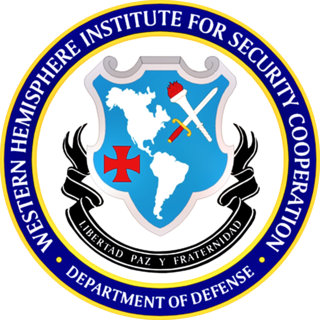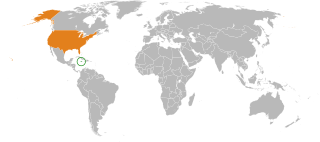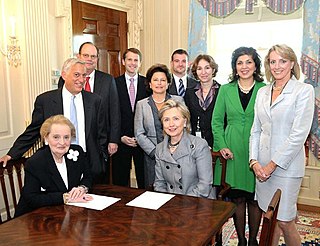
The Western Hemisphere Institute for Security Cooperation (WHINSEC),, formerly known as the The School of the Americas, is a United States Department of Defense Institute located at Fort Benning in Columbus, Georgia, created in the 2001 National Defense Authorization Act.
The United States Agency for International Development (USAID) is an independent agency of the United States federal government that is primarily responsible for administering civilian foreign aid and development assistance. With a budget of over $27 billion, USAID is one of the largest official aid agencies in the world, and accounts for more than half of all U.S. foreign assistance—the highest in the world in absolute dollar terms.

The Alliance for Progress, initiated by U.S. President John F. Kennedy in 1961, aimed to establish economic cooperation between the U.S. and Latin America. Governor Luis Muñoz Marín of Puerto Rico was a close advisor on Latin American affairs to Kennedy, and one of his top administrators, Teodoro Moscoso, the architect of "Operation Bootstrap", was named the coordinator of the program by President Kennedy.

The Kennedy Doctrine refers to foreign policy initiatives of the 35th President of the United States, John Fitzgerald Kennedy, towards Latin America during his administration between 1961 and 1963. Kennedy voiced support for the containment of communism as well as the reversal of communist progress in the Western Hemisphere.
Points of Light is an international nonprofit, nonpartisan organization headquartered in the United States dedicated to engaging more people and resources in solving serious social problems through voluntary service.

Catholic Relief Services (CRS) is the international humanitarian agency of the Catholic community in the United States. Founded in 1943 by the United States Conference of Catholic Bishops, the agency provides assistance to 130 million people in more than 110 countries and territories in Africa, Asia, Latin America, the Middle East and Eastern Europe.

Sister Cities International (SCI) is a nonprofit citizen diplomacy network that creates and strengthens partnerships between communities in the United States and those in other countries, particularly through the establishment of "sister cities". A total of 1,800 cities, states, and counties are partnered in 138 countries around the world. The organization "strives to build global cooperation at the municipal level, promote cultural understanding and stimulate economic development".

The Inter-American Dialogue is a U.S.-based think tank in the field of international affairs primarily related to the Western Hemisphere. Headquartered in Washington, D.C it intends to "foster democratic governance, prosperity, and social equity in Latin America and the Caribbean". The Dialogue's research areas focus on the rule of law, education, migration, remittances, energy, climate change and extractive industries.
Witness for Peace (WFP) is a United States-based grassroots organization founded in 1983 that opposed the Reagan administration's support of the Nicaraguan Contras, denouncing widespread atrocities by these counterrevolutionary groups. Witness for Peace Solidarity Collective brought U.S. citizens to Nicaragua to see the effects of their government's military policy firsthand. Since the end of the Contra war, they have broadened their focus to other Latin American and Caribbean countries, including Colombia and Honduras. Within Latin America, the organization is known by the Spanish name Accion Permanente por la Paz.
Citizen Corps is a program under the Department of Homeland Security that provides training for the population of the United States to assist in the recovery after a disaster or terrorist attack. Each local Citizen Corps Council partners with organizations, volunteers and businesses to organize responders, volunteers and professional first responders for an efficient response so efforts are not wasted by being duplicated. By training in Incident Command, volunteers know whom to report to and how the incident is organized. This prevents sites from being inundated by untrained and unprepared personnel preventing operation. Citizen Corps also works in conjunction with the Corporation for National and Community Service in promoting national service opportunities for promoting homeland security needs.

The Monroe Doctrine was a United States policy that opposed European colonialism in the Americas. It argued that any intervention in the politics of the Americas by foreign powers was a potentially hostile act against the United States. It began in 1823; however, the term "Monroe Doctrine" itself was not coined until 1850.

Latin America–United States relations are relations between the United States of America and the countries of Latin America. Historically speaking, bilateral relations between the United States and the various countries of Latin America have been multifaceted and complex, at times defined by strong regional cooperation and at others filled with economic and political tension and rivalry. Although relations between the U.S. government and most of Latin America were limited prior to the late 1800s, for most of the past century, the United States has unofficially regarded parts of Latin America as within its sphere of influence, and for much of the Cold War (1947–1991), actively vied with the Soviet Union for influence in the Western Hemisphere.

Best Buddies International is an American nonprofit 501(c)(3) organization. It consists of volunteers that create opportunities for people with intellectual and developmental disabilities (IDD). The program's main purpose is to allow volunteers to be paired up with a buddy with an intellectual and developmental disability and provide them with a friend or a mentor. Best Buddies is the world's largest organization dedicated to ending the social, physical and economic isolation of the 200 million people with IDD. It is an international movement that has spread to over 54 countries worldwide.

Brazil–United States relations are the bilateral relations between Brazil and the United States. Relations have a long history. The United States was the first country to recognize Brazilian independence, and Brazil was the only South American nation to send troops to fight alongside the Allies in World War II. Though never openly confrontational towards each other, the two countries have had relatively-distant relations, with brief periods of co-operation. While Brazilian-American relations strengthened significantly after the election of Dilma Rousseff as president of Brazil in 2010 and the recent deterioration of Brazil–Iran relations, there has been a period of tension in relations over the June 2013 revelation of US mass surveillance programs in Brazil after there had been proof of American spying on Rousseff. Rousseff cancelled a scheduled visit to the US in September 2013 in protest over such revelations. This tension receded somewhat in 2014 after it became clear that US President Barack Obama had not been directly involved in surveillance programs. Relations have improved markedly since Rousseff's state visit on June 30, 2015 to the United States, nearly two years after she had canceled a previous visit to the United States over the spying scandals. In 2019 with the victory of Jair Bolsonaro, the two countries approached again, signing deals in the areas of research, security and defense, Bolsonaro and Trump are considered regional allies.

The diplomatic relationship between the United States of America and Zambia can be characterized as warm and cooperative. Several U.S. administrations cooperated closely with Zambia's first president, Kenneth Kaunda, in hopes of facilitating solutions to the conflicts in Rhodesia (Zimbabwe), Angola, and Namibia. The United States works closely with the Zambian Government to defeat the HIV/AIDS pandemic that is ravaging Zambia, to promote economic growth and development, and to effect political reform needed to promote responsive and responsible government. The United States is also supporting the government's efforts to root out corruption. Zambia is a beneficiary of the African Growth and Opportunity Act (AGOA). The U.S. Government provides a variety of technical assistance and other support that is managed by the Department of State, U.S. Agency for International Development, Millennium Challenge Account (MCA) Threshold Program, Centers for Disease Control and Prevention, Department of Treasury, Department of Defense, and Peace Corps. The majority of U.S. assistance is provided through the President's Emergency Plan for AIDS Relief (PEPFAR), in support of the fight against HIV/AIDS.

Jamaica–United States relations are bilateral relations between Jamaica and the United States.
The Pan American Development Foundation (PADF) is a non-governmental and non-political organization created in 1962 by the Organization of American States (OAS), the public sector and the private sector to focus on issues of pressing concern in the Western Hemisphere. PADF, a non-profit organization, has worked in every country in the region. PADF aims to bring together stakeholders to create sustainable economic development, strengthen civil society and respond to natural disasters for the most disadvantaged people in Latin America and the Caribbean.
The Peace Corps is an independent agency and volunteer program run by the United States Government providing international social and economic development assistance. The program was established by Executive Order 10924 issued by President John F. Kennedy in March 1961 and authorized by Congress on September 22, 1961 with passage of the Peace Corps Act.

In his "A New Beginning" speech on June 4, 2009, at Cairo University in Cairo, Egypt, President of the United States Barack Obama stated that "I've come here to Cairo to seek a new beginning between the United States and Muslims around the world, one based on mutual interest and mutual respect, and one based upon the truth that America and Islam are not exclusive and need not be in competition. Instead, they overlap, and share common principles – principles of justice and progress; tolerance and the dignity of all human beings." During the speech, he also committed to "host a Summit on Entrepreneurship this year to identify how we can deepen ties between business leaders, foundations and social entrepreneurs in the United States and Muslim communities around the world".

Koyamada International Foundation, commonly referred to as KIF or KIF Global, is an international non-governmental organization, with its mission to improve quality of people's life by empowering global youth and women to reach their full potential and by providing humanitarian aid to promote global peace and sustainable development. It has affiliated national chapter members in seven countries.














